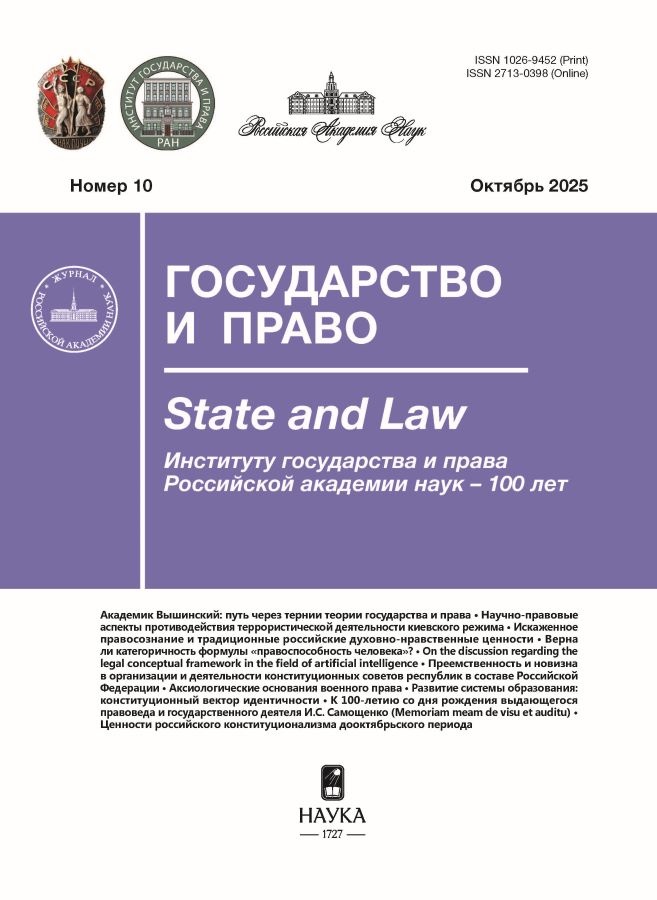Универсализм в социальной политике скандинавских государств
- Авторы: Черкасов А.И.1
-
Учреждения:
- Институт государства и права Российской академии наук
- Выпуск: № 11 (2023)
- Страницы: 178-184
- Раздел: За рубежом
- URL: https://vestnik.nvsu.ru/1026-9452/article/view/648827
- DOI: https://doi.org/10.31857/S102694520028728-1
- ID: 648827
Цитировать
Полный текст
Аннотация
В статье рассматривается роль принципа универсализма как «краеугольного камня» социальной политики скандинавских государств. Подчеркивается, что скандинавский универсализм традиционно базируется на более высоком уровне социального равенства, чем тот уровень, который присутствует в рамках иных систем социальной защиты, нацеленных на выборочный подход и социальную стратификацию. Скандинавская модель социального обеспечения в последнее время сталкивается с целым рядом проблем, связанных с глобализацией, обострением конкуренции на рынке труда, демографическими изменениями, расширяющимся притоком мигрантов. В сложившейся ситуации данная модель становится все более экономной и рыночно ориентированной, а действующие социальные программы корректируются путем сокращения их избыточной щедрости. Растет понимание необходимости расширения принципа универсализма и внедрения в социальную политику гораздо большей дифференциации с учетом реальных потребностей отдельных слоев населения.
Ключевые слова
Об авторах
Александр Игоревич Черкасов
Институт государства и права Российской академии наукРоссийская Федерация, Москва
Список литературы
- Bakke I. B. The “Idea of Career” and “a Welfare State of Mind”: On the Nordic Model for Welfare and Career // Career and Career Guidance in the Nordic Countries / еd. by E.H. Haug, T. Hooley, J. Kettunen, R. Thomsen. Leiden, 2020. P. 23–36.
- Blomquist P., Palme J. Universalism in Welfare Policy: The Swedish Case beyond 1990 // Social Inclusion. 2020. Vol. 8. Iss. 1. P. 114.
- Borevi K. Multiculturalism and Welfare State Integration: Swedish Model Path Dependency // Identities: Global Studies in Culture and Power. 2014.Vol. 21. No. 6. Р. 708, 711.
- Breidahl K. N., Hedegaard T. F., Kongshøj K., Larsen Ch. A. Migrants’ Attitudes and the Welfare State: The Danish Melting Pot. Cheltenham, 2021. Р. 6.
- Brochman G., Hagelund A., Borevi K., Jønsson H. V., Petersen K. Immigration Policy and the Scandinavian Welfare State 1945–2010. Basingstoke, 2012. Р. 1, 2, 13, 14, 25, 150.
- Czarny R. M. A Modern Nordic Saga: Politics, Economy and Society. Cham, 2017. Р. 85.
- Debating Multiculturalism in the Nordic Welfare States / еd. by P. Kivisto, Ö. Wahlbeck. Houndmills, 2013. P. 11.
- Egalitarianism in Scandinavia: Historical and Contemporary Perspectives / ed. by S. Bendixsen, M.B. Bringslid, H. Vike. Cham, 2018. Р. 9, 10, 138, 225.
- Esping-Andersen G. The Three Worlds of Welfare Capitalism. Princeton, 1990. P. 27, 28.
- Frelle-Petersen C., Hein A., Christiansen M. The Nordic Social Welfare Model: Lessons for Reform. Copenhagen, 2020. Р. 11, 20.
- Forsander A. Social Capital in the Context of Immigration and Diversity: Economic Participation in the Nordic Welfare State // JIMI/RIMI. 2004. Vol. 5. No. 2. Р. 214, 219.
- Greve B. Denmark: Still a Nordic Welfare State After the Changes of Recent Years? // Challenges to European Welfare Systems / ed. by K. Schubert., P. de Villota., J. Kuhlmann. Heidelberg, 2017. P. 172, 176.
- Greve B. What Characterise the Nordic Welfare State Model // Journal of Social Sciences. 2007. Vol. 3. No. 2. P. 44.
- Kiesel V. The Promise of Universalism – Gender, Migration, and the Limits of the Nordic Welfare State // IZGOnZeit. 2020. No. 9. Р. 37.
- Kildal N., Kuhnle S. The Principle on Universalism: Tracing a Key Idea in the Scandinavian Welfare Model. Bergen, 2002. Р. 1, 2, 5.
- Lapidus J. The Quest for a Divided Welfare State: Sweden in the Era of Privatization. Cham, 2019. Р. 51.
- Melin H. The Nordic Model and Social Inequalities // Welfare State at Risk: Rising Inequality in Europe / ed. by D. Eißel, E. Rokicka, J. Leaman. Heidelberg, 2014. Р. 107, 108.
- Petersen O. H., Hjelmar U. Marketization of Welfare Services in Scandinavia: A Review of Swedish and Danish Experiences // Scandinavian Journal of Public Administration. 2014. Vol. 17. No. 4. Р. 5.
- Promoting Active Citizenship: Markets and Choice in Scandinavian Welfare / ed. by K. H Sivesind, J. Saglie. Oslo, 2017. P. 5, 294.
- Sipilä J, Anttonen A, KrÖger T. A Nordic Welfare State in Post-industrial Society // The Welfare State in Post-industrial Society: A Global Perspective / ed. by J. L. Powell, J. Hendricks. Dordrecht, 2009. Р. 182 - 185, 188, 195.
- The Nordic Models in Political Science: Challenged, but Still Viable? / еd. by O. Knutsen. Bergen, 2017. Р. 6.
- The Relational Nordic Welfare State: Between Utopia and Ideology / ed. by S. Hänninen, K-M. Lehtelä, P. Saikkonen. Cheltenham, 2019. P. 2.
- Viggeland N. Democratic Governance in Scandinavia: Developments and Challenges for the Regulatory State.Cham, 2020. Р. 70.
- Vike H. Politics and Bureaucracy in the Norwegian Welfare State: An Antropological Approach. Cham, 2018. Р. 86, 138, 139.
- Voluntary and Public Sector Collaboration in Scandinavia: New Approaches to Co-Production / ed. by B. Ibsen. Cham, 2021. P. 52, 53, 59.
Дополнительные файлы








